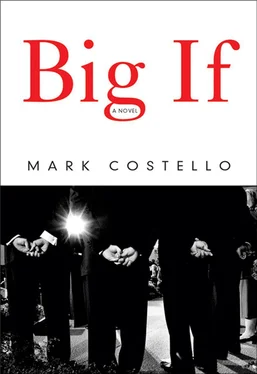They flew her back to Beltsville on a government Gulfstream. They took her to Psych Services, dumped her in a room with a heavy maple table, big enough for two, and soundproof panels on the walls. She asked the two-way mirror for a Coke and a few minutes later, there was a knock. It was Boone Saxon, a senior threat investigator, carrying a can of Pepsi.
Boone said, “Will Pepsi be all right?”
She touched the can; it was warm. She asked the mirror for a cup of ice.
Boone took her through the story from the helo in the outfield to the shootout with the looters and what happened in the trailer as it rolled. It was not a hostile Q&A, there were no Mirandas, but it wasn’t altogether friendly either, and she didn’t understand why it was Boone Saxon asking all the questions. Why not Gretchen? Why not Human? It didn’t make much sense. Boone was a threat man; he only did the threats.
“Let’s go through it one more time,” Boone said. They went through it one more time. Vi asked for ice again, looking at herself and saying, “Can I get some fucking ice?”
They went through it many times and Boone was finally satisfied.
He turned to the mirror. “Get the ice,” he said.
The Service gave her three days off to recover from the flood. Vi, not knowing where else to go, went back to Center Effing and stayed at her brother’s house. It was a bad visit. She was strung out, sweaty-palmed, jumping at small noises, and she fought with Jens the whole time. By the end of the three days, she was glad to go back to the detail.
There was a rumor boom when Vi rejoined the team, and this became another way to pass the time between campaign events, the red-eyes and the van rides and the predawn breakfasts in the hotel coffee shops. The snipers said that Boone Saxon’s men were looking for Lloyd Felker, the person or the corpse, a big clandestine manhunt with negative results. The bomb techs said that Felker was definitely muerto —Boone Saxon had found him bloated, washed up in Kentucky, and they were only waiting on the dentals to announce it. This story grew less plausible with time — how long could dentals take? Soon the bomb techs were agreeing with O’Teen, who said that Felker was alive in Mexico, working as a bodyguard for the cocaleros, doesn’t speak the language and his memory is gone, like Charlton Heston’s buddy in The Planet of the Apes —the only thing he remembers is how to scan the hands, and the superstitious Mexicans call him El Pantero or the Man in Pants. The comm techs scoffed at El Pantero; they had good hard rumors placing Felker in Kansas City, Denver, several shitholes in Nevada, and Duprete, Missouri. Bobbie Taylor-Niles said that Felker was alive — she insisted on a happy ending — and she even watched the ropelines for him, thinking Felker might come in from the crowd one day. Vi herself did not believe or disbelieve that Felker was dead in the river or alive, though she watched the ropes for him as well, in the spirit of a porch light you leave on.
Felker’s death or disappearance affected everybody differently. Herc Mercado got a buzz cut. O’Teen gave up cigarettes. Gretchen tried to lose some weight. Tashmo bought a pickup truck (he’d always wanted one).
Herc, who lacked compassion, coined a word, Lloydify , which meant a total mental breakdown under pressure in the field. You could do a Lloyd or pull a Lloyd or feel somewhat Lloydish, and, after what they saw in Hinman, many of them did. When Sean Elias joined the team as deputy lead agent and heard his first Lloyd-word, Vi had to tell him where it came from.
Vi came back from her run, took a long hot shower, and ate a piece of toast, sitting on the futon, looking at the dusty plants along the windowsill, her home in Tower South that was never quite a home.
Most of the agents on the team had fairly shitty home lives, so Vi didn’t feel too bad having none at all. There was old Tashmo, cranky, middle-aged, thirty years a bodyguard, whose wife was always after him to fix the car, fix the disposall, who didn’t give him a goddamn minute’s peace the one day a week Tashmo managed to get home. There was Herc Mercado, twice divorced and not yet thirty, who often slept on O’Teen’s couch because his latest manic girlfriend had locked him out and he was sick of breaking his own door in. There was O’Teen himself, a balding bachelor who had tried computer dating but found that he kept getting matched up with losers, for some reason. And Felker too — he loved his wife and son; he was always telling Vi how much he missed them when he went away. But if he loved them so much, why did he walk into the flood? Was that the act of a happy man? Gretchen Williams was another story. Vi, as Gretchen’s assigned driver, picked her up and dropped her off at home before and after each deployment. Every time Vi did, she saw how Gretchen and her son set each other off, the little fights, the tension in the air. Why the agents had such shitty home lives was a question Vi had asked herself many times. The pressures of the detail were special and acute — the endless travel, the need to toggle back and forth from vacant mode along the ropes (the total watchfulness, scan the hands and scan the hands, always the hair trigger) to normal people mode, whatever that might be.
Vi dressed and went down to the lobby to wait for Bobbie Taylor-Niles. Most bodyguards had rocky lives away from vacant mode, but nobody’s was rockier than Bobbie’s. When they traveled with the VP, Vi and Bobbie roomed together, dressed together, ate together, worked together, flirted with the newsmen in the hotel bars together. Sometimes, on the worst nights, after a big crowd, a day of overflowing crowds, they even slept together, two women in a bed sized for a king. They would get into their hotel room at nine or ten p.m., strip themselves of clothes, comm net, shooting harness, body armor. They would shower (not together), and maybe, if they were feeling wanton, slip into play clothes, as Bobbie called them, jeans and a t-shirt for Vi, pearls and a plum blazer for Bobbie, and go down to the lobby bar or up to the roof bar, wherever the hotel was serving alcoholic drinks, and have an alcoholic drink, lite beer for Vi, and for Bobbie vodka up.
Bobbie Taylor-Niles was a presence in a bar, a beauty and a bombshell and a magnet for the guys, less a woman than an ocean liner of desire, continuous and sleek, with long, knifing legs and hair a shade her colorist called sand , short for Streisand. Bobbie called herself the scenic route and men seemed to agree. She was not exactly young these days (she was frank about her age, which was thirty-nine-and-seven-quarters), but young men found her sexy in the older-woman way and old men found her sexy, period. This last fact was strategically important, Bobbie said, because she planned to marry a distinguished man of years and reputation, wealthy or at least well-to-do, a carnal, cynical arrangement maybe, but Bobbie had tried every other kind of marriage.
She numbered her ex-husbands I, II, and III, like movie sequels or world wars. Husband I was her first supervisor in the Criminal Division, El Paso station, a guy named Doyle Doak, who did rope tricks in his office and crossed into Mexico for eyeglass appointments, saved a couple bucks that way, no wonder he was always sea-sick, fucking cheap-ass dick, Bobbie said. In Washington, she met Husband II, a Senate lawyer who wrote banking regulations, who was quite a force in banking regulation, but who lost his job when he forgot to put not in a certain crucial sentence, accidentally abolishing all private debt in the United States. Bobbie, disappointed, left Husband II for Husband III, a surgeon in Virginia, an oral surgeon — actually a dentist, which was pretty much the same thing as a surgeon, Bobbie said. The dentist, Dr. Potter Niles, had a spreading practice in the suburbs and was certainly not poor. Vi had never met the dentist, never heard his voice, and Bobbie rarely spoke of him except to ridicule his taste in things, which was, she said, ultra— Reader’s Digest . Dr. Potter Niles read the Reader’s Digest s in his own waiting room and Bobbie sometimes caught him lounging in his waiting room at night, like it was a real living room. She left the dentist and moved in with an old flame, the man she called the Admiral, a two-star Navy surgeon, a true medical surgeon, the former personal physician to the president.
Читать дальше












